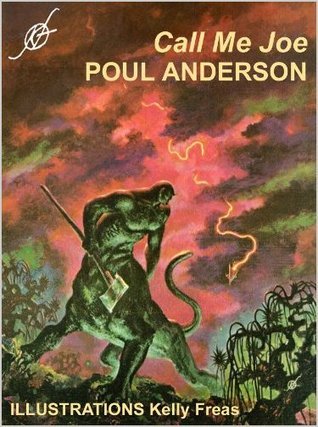What do you think?
Rate this book


34 pages, Kindle Edition
First published January 1, 1957
In this 1957 sci-fi classic, Poul Anderson plays with the traditional sci-fi notion of the importance of humanity above everything else. No matter what alien places we visit and how many alien races we see, humanity remains above all, the most important, the vital, what we cling on, what we cannot afford to lose. Encountering something unfamiliar, something not human, naturally alarms us and sends us clinging to our humanity in defense. Anderson's character, however, finds something in the alienness that he does not get through his humanity. He embraces the alienness with everything he has, finally able to fully live through it.
"Jupiter lay across a fifth of that sky, softly ambrous, banded with colors, spotted with the shadows of planet-sized moons and with whirlwinds as broad as Earth."
"Imagine walking under a glowing violet sky, where great flashing clouds sweep the earth with shadow and rain strides beneath them. Imagine walking on the slopes of a mountain like polished metal, with a clean red flame exploding above you and thunder laughing in the ground. Imagine a cool wild stream, and low trees with dark coppery flowers, and a waterfall - methanefall, whatever you like - leaping off a cliff, and the strong live wind shakes its mane full of rainbows! Imagine a whole forest, dark and breathing, and here and there you glimpse a pale-red wavering will-o'-the-wisp, which is the life radiation of some fleet, shy animal, and... and...[...] Imagine being STRONG!"If my description of a remote-controlled (by a paraplegic, no less) artificial life form somewhat reminds you of that blue-alien movie "Avatar" - well, there is a reason for that. Call Me Joe undoubtedly served as an inspiration for it. But the major difference here is that Call Me Joe is what "Avatar" could have been if the movie was a bit less blatant wish-fulfillment fantasy. If the feline romance, breathtaking (for humans, of course) landscapes, frolicking among flowers, and alien dragon rides were removed, and there was no clumsily constructed preachy story about a clearly black-and-white conflict. If instead we were left with trying to live in the harsh but beautiful reality, with a new personality emerging out of the two that share the same brain and mind.
“Perhaps you don't realize what a nightmare planet Jupiter is. Not just the surface gravity - a shade under three gees, what's that? - but the gravitational potential, ten times Earth's. The temperature. The pressure. Above all, the atmosphere, and the storms, and the darkness!”Jupiter in this story is an inhospitable alien planet, breathtaking only in its unsuitability for human life. But Joe, specifically created to thrive in this environment, sees something else - a home.
"What I can't put in is how Jupiter looks through a Jovian's infrared-seeing eyes. [..] Just remember that everything about Jupiter which is cold and poisonous and gloomy to us is right for Joe."Joe is a Pseudocentaurus sapiens created to be functional in the Jupiter high-pressure atmosphere (breathing hydrogen and drinking methane, all that) for the purpose of transmitting valuable knowledge to humans. Made with a fully functional brain, he is mentally controlled by a paraplegic scientist Ed Anglesey, who - as a psychology-type Cornelius figures out - imprints his entire personality on Joe's brain. And Cornelius worries that Joe's nascent personality is taking over Anglesy in the - of course, what else can it be? - monstrous fashion. "Because, I suppose, of normal human fear of the unknown, we assumed that any personality in so alien of a body had to be monstrous." But is there more to it? The answer is yes, of course.
"I, the cripple, feel all the tiredness, anger, hurt, frustration, of that wonderful biological machine called Joe. The others don't understand. When the ammonia gale flays open his skin, it is I who bleed."Call Me Joe is written simply and straightforwardly, with skillful juxtaposition of Jupiter scenes and events at the human space station. It deals with the questions of identity and importance of quality of life (not a very politically correct subject, I must admit) in an insightful way. The traditional sci-fi exposition is integrated into the story quite nicely and does not feel forced or clunky. Granted, I understand that the happy ending of the story has all the potential to become quite problematic - but then every time I decide to put aside my world-weary cynicism and simply enjoy this pure beautiful sci-fi story.
“I've seen these cases before. People who simply resign from life. This is the first one I ever saw that went out smiling - smiling all the time.”


